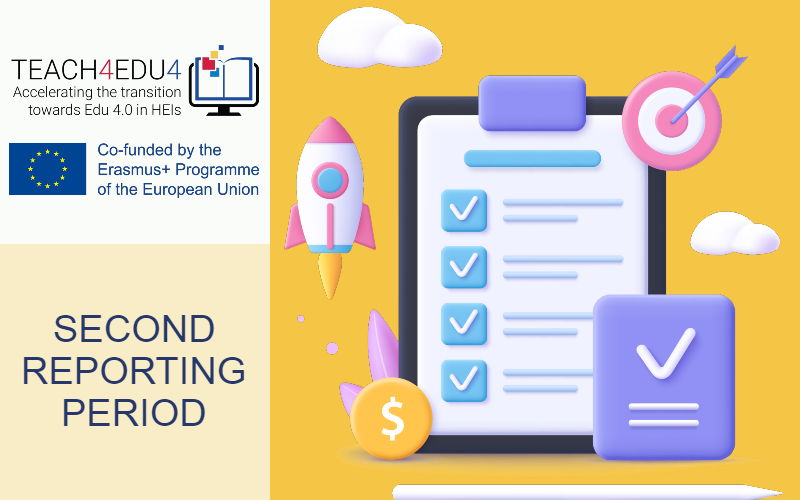The second reporting period on the project Erasmus+ TEACH4EDU4 project has been completed.
Here is an overview of the objectives that have been accomplished: for the IO1 Catalogue of new forms of teaching, learning, and assessment in Computer Science in Edu 4.0 and related teachers’ skills and competencies, a partner meeting was held in Varaždin, where the Open University has shared experience through a tool presentation workshop for teachers. The contribution of Open University was big also on the next partners meeting in Belgrade, with holding an introductory class to learning design.
Within the IO2 Learning design models, the teachers of the selected JCCs used the proposed learning design tool (T4ELD) to design their own courses that will be taught as JCCs. Teachers used T4ELD to plan, design, and re-think about the courses they will carry out as JCCs. The T4ELD tool has been further improved based on the teachers’ comments and uploaded to the project web page under Results and Erasmus+ results platform as the first version of the IO.
The current reporting period has been very intensive and productive for IO3: Collaborative Teaching Methods for Joint Creative Classrooms since two joint Creative Classrooms (JCCs) have been executed (both Summer School on Data Analytics/Machine Learning and the Software Architectures Analysis and Design). Five more have been planned, which are going to start in the next semester. Overall, the initial project activities have been carried out, and the objectives reached.
Furthermore, an extensive literature review has been developed for the IO4 Guidebook on the use of learning data, providing input to all milestones defined in the project - analyzing best practices in the implementation of LA and using dashboards; preparation of technical specifications for dashboards; defining functionalities for student and teacher dashboard; developing dashboards for student and teacher; investigating effective interpretations of LA; preparing recommendations on improvement of LD models for the final output of the IO4 – Guidebook of Best Practices. The Literature Review also provides an overview of methods, tools, systems, frameworks, models, benefits, and challenges of using LA in HEIs reported in the literature and learning analytics-related activities – journals, conferences, projects, organizations, etc. In addition, focus group interviews with 12 academic staff members of Tallinn University were conducted to identify what kind of data would be particularly useful to the academic staff in improving students’ educational experience in a course they were responsible for.
The IO5 Partnership Manifesto started in February 2022. Its prerequisites according to the project proposal were presented on the 3rd TPM in Belgrade regarding the first activities and involvement of partners. The working plan document for this result is in the development process. More activities regarding IO5 will continue after finalizing the ECTS procedure in the following months.
As for the project partners, the monitoring of quality and project progress is carried out by the Univesity of Belgrade, Faculty of Organisational Sciences, throught regular evaluations. Through questionnaires issued after transnational meetings, quality of organization and satisfaction of participants were evaluated. Teachers' evaluation of workshops was evaluated through a separate questionnaire, and many constructed suggestions were received from teachers who participated. Student and teacher evaluation and satisfaction with IO2 and IO3 will be evaluated in the next phases of the project, when activities are carried out. Based on that improvement in the next circles upgraded version of IO2 will be implemented. On the other hand, the Risk Manager from Tallinn University assesses the existence, availability, and update of documents, project communication, and questionnaires regarding quality assurance and risks management. Risk managers monitored predicted risks and early warning indicators regarding IO2, IO3, and IO4 and presented them at the partners' meetings. So far all risks have been avoided.
Partners participated together in the production of the article “When industry meets Education 4.0: What do Computer Science companies need from Higher Education?" at the TEEM 21 conference, in the JCC planning and performance according to the possibilities and also with involving teachers and contacting associated partners. For the production of IOs, the model defined at the beginning of the project was applied also in this reporting period - there is one responsible partner for each IO, but all partners have contributed through their representatives. In this way, the expertise and different perspectives are combined on each IO throughout all partners. All partners continuously contribute through dissemination, data for reporting, and quality assurance by fulfilling questionnaires after project events and giving proposals for improvement.
During the period 01.08.2021- 28.02.2022. Universitat Politècnica de Catalunya has informed companies (associated partners of the project) about the different ongoing activities and open possibilities for participation, especially in Joint Creative Classrooms (JCCs) organized, also based on signed agreements with choosen interest from companies.
